Karachi, the most populous city in Pakistan, is also called ‘mini Pakistan’ as people from all over the country come here to earn a living and make their home in one of the numerous lower income housing settlements in the city. Pehlwan Goth is one such settlement and is home to many families from the province of Khyber Pakthunkhwa. It is a high-risk area for polio with environment samples often being positive.
Pehlwan Goth is settlement of a mix of posh and slum settlers, with three to four story buildings adjacent to lower income housing units. An open sewage drain runs along the length of the settlement, where residents also dispose their trash. Cattle are often seen grazing near the heaps of garbage.
Samreen - on a mission to save the future generations of Pakistan
Samreen, a 25-year-old Polio Area Supervisor, who leads a team of four community health workers, working in this settlement.
“I started working with the polio programme four years ago and I am happy to say we have made a lot of progress here. This is my neighborhood; this is where I grew up and it helps me immensely. People here listen to me, especially the women, and I know most of the children by name,” says Samreen as she goes about her daily routine.
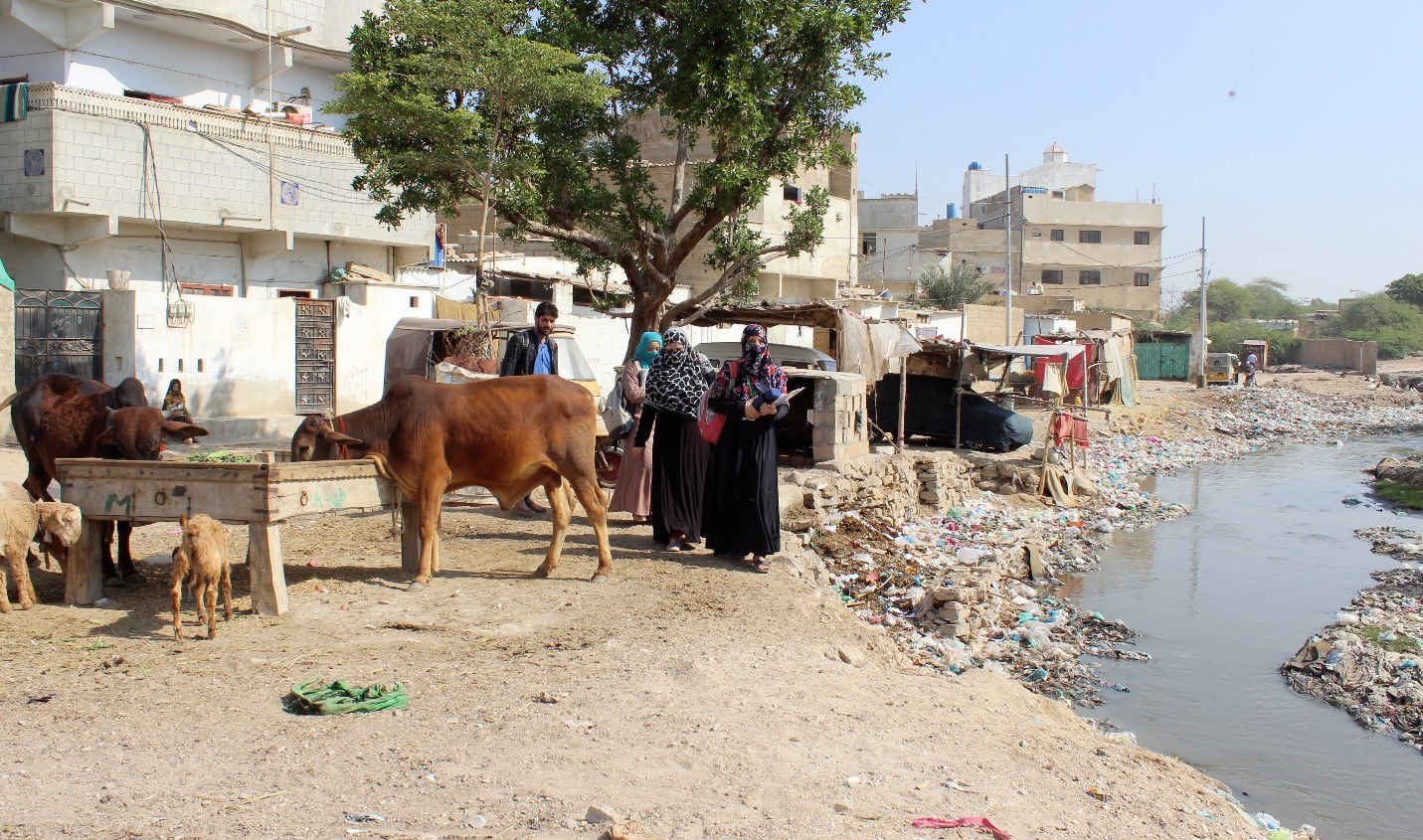 Community Health Workers go about their daily routine to give children OPV in Pehlwan Goth in Karachi. Photo: PEI/2020/
Community Health Workers go about their daily routine to give children OPV in Pehlwan Goth in Karachi. Photo: PEI/2020/Converting refusals
Pehlwan Goth was marred by target killings and violence just a few years ago and polio workers found it extremely difficult to work here. Fortunately, in recent years, the security situation has significantly improved, making it possible for the polio programme to deploy community health workers to reach and vaccinate children in the area. There are around 32,000 children under 5 years of age in Pehlwan Goth. In April 2019, parents of around 3,000 children refused the polio vaccine. Through the hard work of supervisors like Samreen, over 80 per cent of these children received vaccination.
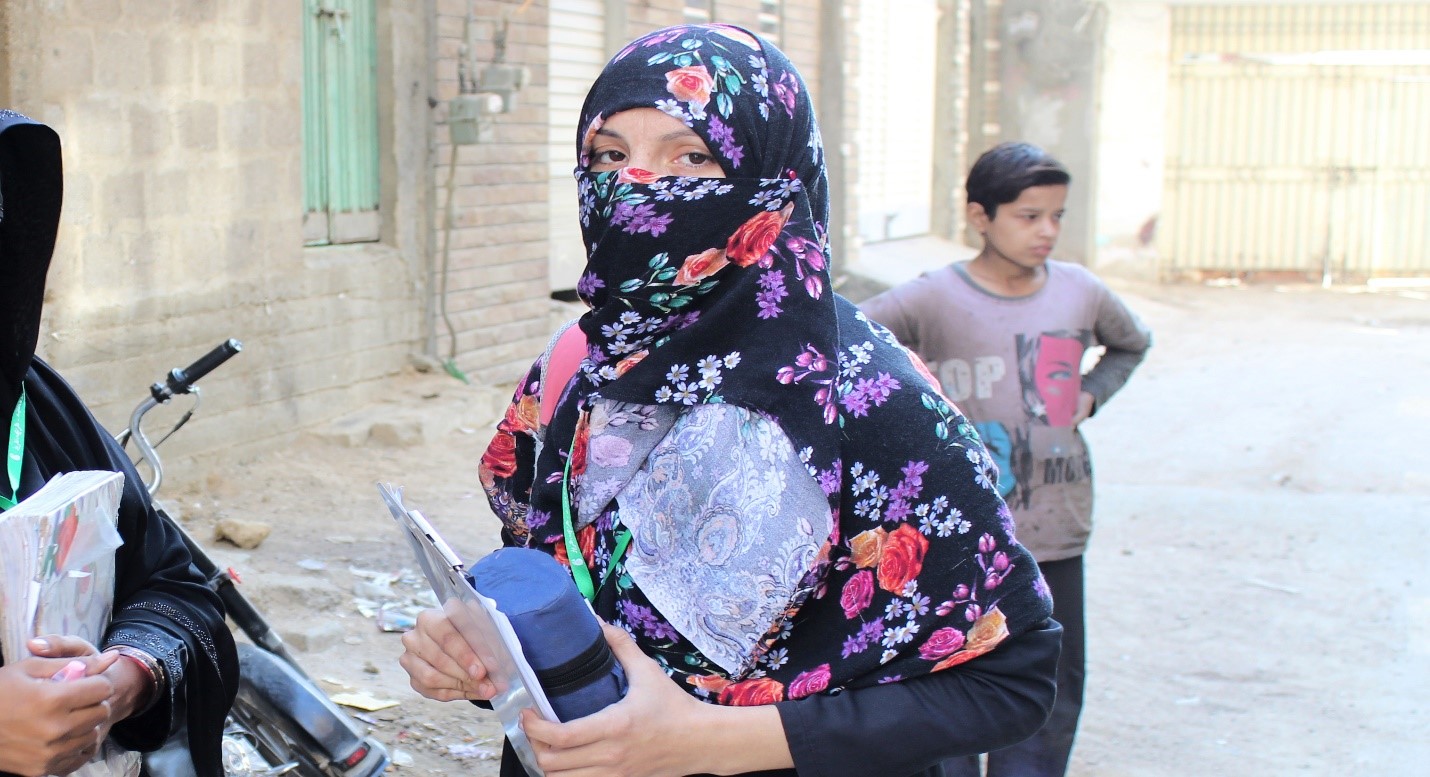 Samreen – a committed Area Supervisor,Pehlwan Goth Photo: PEI/2020/
Samreen – a committed Area Supervisor,Pehlwan Goth Photo: PEI/2020/“I am in charge of an area that has 210 households with 196 children. In 2019, families of more than 50 children refused vaccines. That’s almost one fourth of all the children in my area,” said Samreen.
“Building trust takes time, and we continued engaging with community members, visiting families, listening to their concerns, and explaining the benefits of vaccination. Today, we have only eight refusal cases out of 50. I will try my level best to bring them down to zero during the polio campaign next month. But it is not about just converting refusals during every campaign, I want all families to understand the benefits of vaccines in the long run and immunize their children against polio and other diseases.”
Her efforts were evident during a house visit. A family with three children who had refused vaccines the previous month offered no resistance to their children receiving the life-saving polio drops.
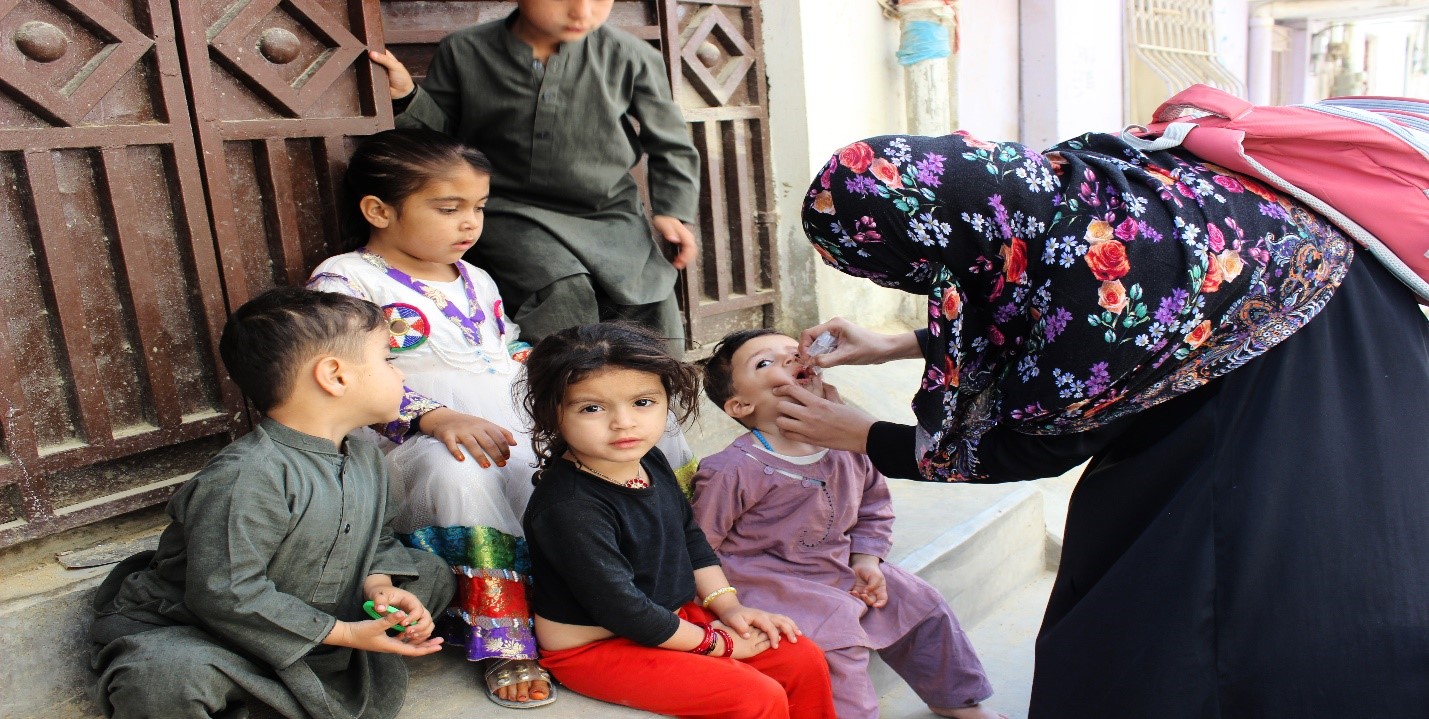 Samreen vaccinating children of a refusal family that she converted during the December19 campaign.
Samreen vaccinating children of a refusal family that she converted during the December19 campaign.Team up to confront misconception
It was not an easy task. Samreen is supported by a team comprising a local social mobilizer and a local religious support person who addresses misconceptions and raises awareness on health-related practices among mothers, fathers and caregivers
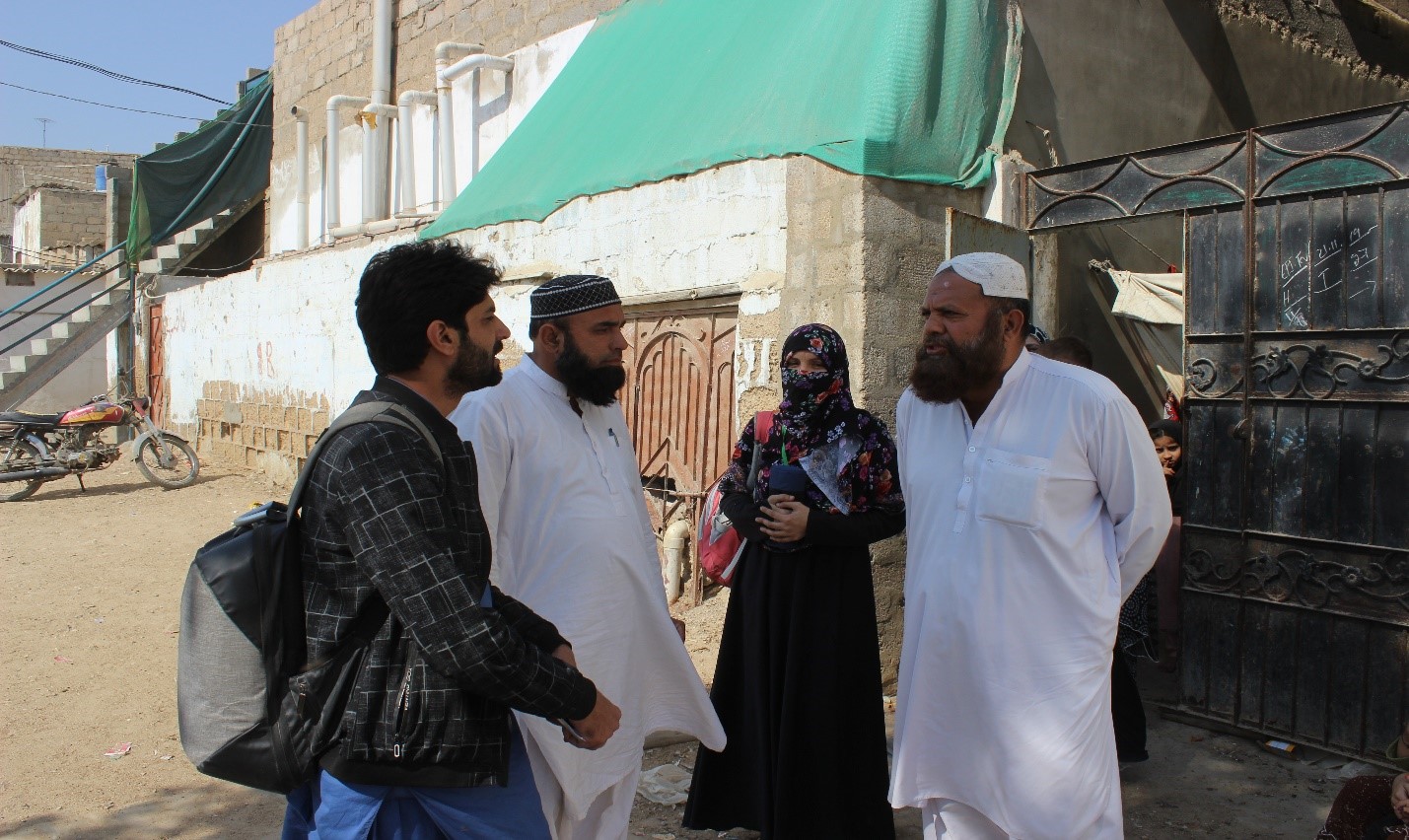 Samreen with her team including RSP Mualana Mohammad Hanif and UCCSO Saeed Khan speaking on the left with Tayyab Khan, a local resident. Photo: PEI/2020/
Samreen with her team including RSP Mualana Mohammad Hanif and UCCSO Saeed Khan speaking on the left with Tayyab Khan, a local resident. Photo: PEI/2020/“We speak the same language and our homes are in the same area where we work. It is easier to communicate with people when you are part of the same community,” said Maulana Mohammad Hanif, the religious support person who is one of Samreen’s team members.
However, one negative social media video or news item can reignite refusals and overturn all their efforts. “The process takes time. The work is tough but I am grateful to ‘Allah’ for this job which allows me to feed my family and contribute to a noble cause – of saving the future generations of Pakistan,” added Maulana Mohammad Hanif.
I accompanied Samreen as she went from school to school and door to door, supporting her team to reach as many children as possible.
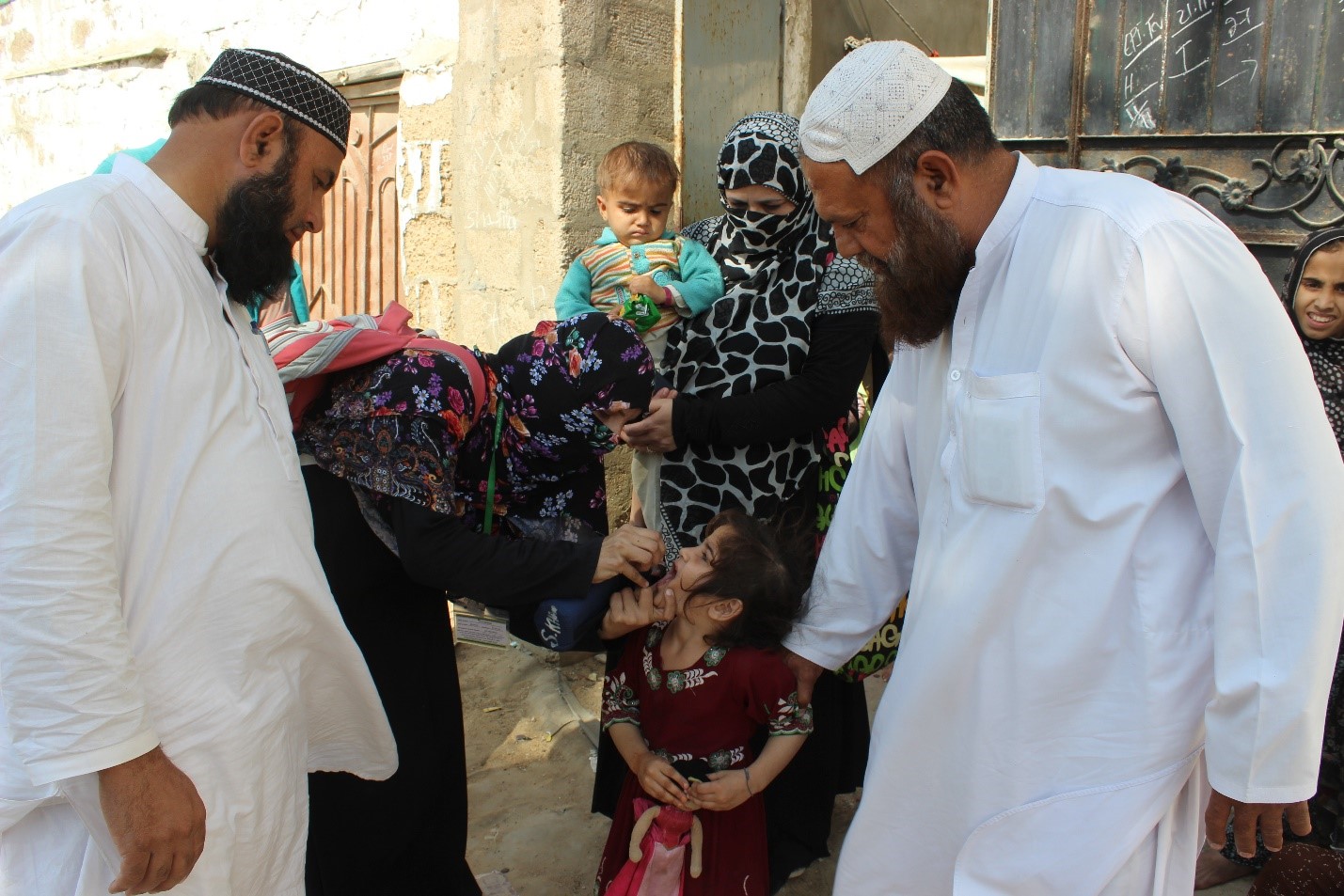 Samreen and Maulana Mohammad Hanif vaccinating the children of Tayyab Khan. Photo: PEI/2020/
Samreen and Maulana Mohammad Hanif vaccinating the children of Tayyab Khan. Photo: PEI/2020/In Karachi, dedicated people like Samreen and her team are working hard to bring Pakistan closer to polio eradication. With only Pakistan and Afghanistan reaming as the final two countries that are still polio endemic, the country is now running the final mile. But often the final mile is the hardest run and requires the most effort.


